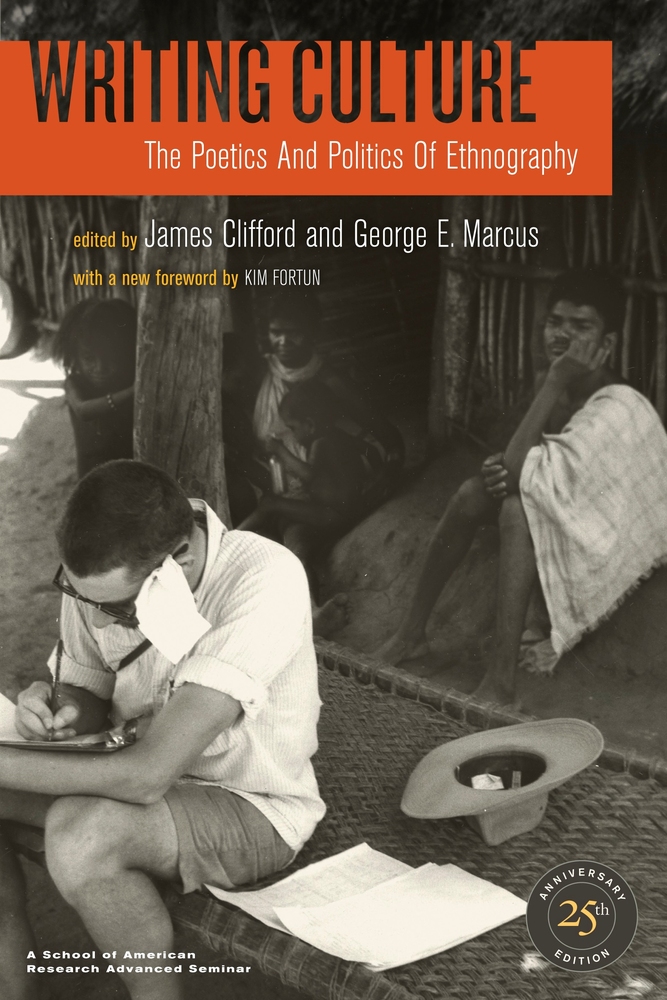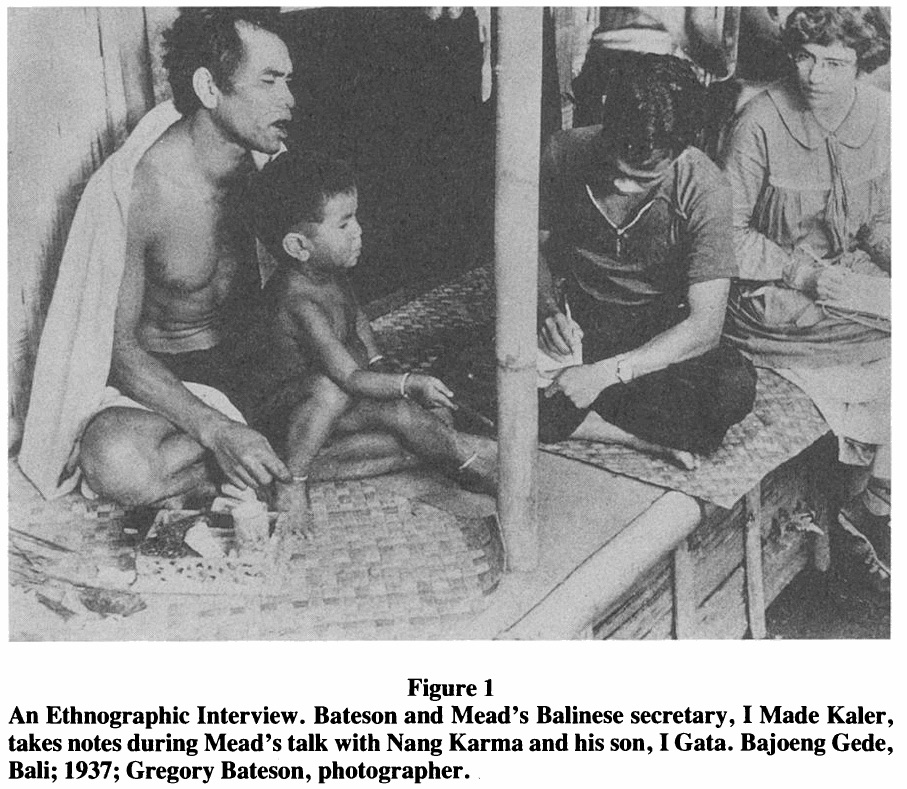エスノグラフィーを通して文化を書くこと
Writing Ethnography, Writing Culture, and Re-Writing Culture and Ethnography
エスノグラフィーを通して文化を書くこと
Writing Ethnography, Writing Culture, and Re-Writing Culture and Ethnography
「この年老いた 天草の農婦の声なき祈りを聞き分けること、それが女性史研究を志すわたしの〈仕 事〉なのだ」(山崎 1972:8)——私[引用者=池田]はここに民族誌(エスノグラフィー)の著者の当事者への倫理抜きの〈書く/描く意思〉を読み取ります(→山崎朋子『サンダカン八番娼館 : 底辺女性史序章』)。
| This seminal
collection of essays critiquing ethnography as literature is augmented
with a new foreword by Kim Fortun,
exploring the ways in which Writing Culture has changed the face of
ethnography over the last 25 years. |
文学としてのエ
スノグラフィーを批評するこの代表的なエッセイ集に、キ
ム・フォーチュンによる新しい序文が加えられ、この25年間で「文化を書く」ことがエスノグラフィーのあり方をどのように変えてきたかが探求されている。 |
| Foreword to the Twenty-fifth
Anniversary Edition Preface JAMES CLIFFORD Introduction: Partial Truths MARY LOUISE PRATT Fieldwork in Common Places VINCENT CRAPANZANO Hermes' Dilemma: The Masking of Subversion in Ethnographic Description RENATO ROSALDO From the Door of His Tent: The Fieldworker and the Inquisitor JAMES CLIFFORD On Ethnographic Allegory STEPHEN A. TYLER Post-Modern Ethnography: From Document of the Occult to Occult Document TALAL ASAD The Concept of Cultural Translation in British Social Anthropology GEORGE E. MARCUS Contemporary Problems of Ethnography in the Modern World System MICHAEL M. J. FISCHER Ethnicity and the Post-Modern Arts of Memory PAUL RABINOW Representations Are Social Facts: Modernity and Post-Modernity in Anthropology GEORGE E. MARCUS Afterword: Ethnographic Writing and Anthropological Careers Bibliography Notes on Contributors Index |
25周年記念版への序文 まえがき JAMES CLIFFORD はじめに 部分的な真理 マリー・ルイス・プラット ありふれた場所でのフィールドワーク ヴィンセント・クラパンツァーノ ヘルメスのジレンマ:民族誌の記述における破壊の仮面化 レナート・ロサルド(RENATO ROSALDO) テントの扉から。フィールドワーカーと審問官 ジェイムズ・クリフォード 「民族誌のアレゴリーについて STEPHEN A. TYLER ポスト・モダン民族誌。オカルト・ドキュメントからオカルト・ドキュメントへ タラル・アサド 「イギリス社会人類学における文化翻訳の概念について ジョージ・E・マーカス 「現代世界システムにおける民族誌の現代的問題点 マイケル・M・J・フィッシャー エスニシティとポスト・モダンの記憶芸術 ポール・ラビノウ 「表象は社会的事実である。人類学におけるモダニティとポスト・モダニティ ジョージ・E・マーカス 「あとがき」:民族誌の執筆と人類学のキャリア 書誌事項 寄稿者ノート 索引 |
| https://ci.nii.ac.jp/ncid/BB04316164 |
|
| Writing Culture is the
title of a highly influential volume, edited by James Clifford and
George Marcus in 1986 (see Clifford and Marcus 1986 cited under Writing
Culture Debate: Writing Culture and Concomitant Texts), which deals
with the “poetics and politics of ethnography,” as its subtitle reads.
Highlighting the epistemic and political predicaments adhering in
ethnographic representation, this book became eponymous for a broader
controversy during the late 1980s and early 1990s. This Writing Culture
debate concerned itself with adequate forms of ethnographic writing,
reflexivity, objectivity, and the culture-concept, as well as
ethnographic authority in an increasingly fragmented, globalized, and
(post)colonial world. Marking an important turn in anthropology,
variously described as “literary,” “reflexive,” “postmodern,”
“deconstructive,” or “post-structural,” the volume and companion
publications (especially Anthropology as Cultural Critique by Marcus
and Fischer 1986, cited under Writing Culture Debate: Writing Culture
and Concomitant Texts) strongly polarized the anthropological community
at the time; celebratory attempts at canonizing Writing Culture as a
long overdue (post)modernist critique of anthropology starkly
contrasted with demonizing dismissals, portraying Writing Culture as
threatening the professional discipline (in both senses of the term).
Throughout the 1990s, debates surrounding the so-called “crisis of
representation” ushered in by Writing Culture increasingly cooled down,
giving way to more nuanced and mediated responses in related fields. In
this sense, repercussions of Writing Culture can be traced in important
redefinitions of anthropology regarding issues such as who should do
fieldwork (e.g., people “at home” in the field or “native”
anthropologists); how it should be done (e.g., collaboratively,
including “informants”; in a reflexive way, problematizing “culture”
and being sensitive to issues of gender, race, and class; or tracing
the translocal in multiple localities); what topics should be studied
(e.g., the “home” countries of anthropology, Western knowledge and
science, or literary practices); and how the results should be
ethnographically represented (e.g., experimentally). Methodologically
speaking, it is difficult, and contestable, to relate such common
concerns and systematic equivalences within contemporaneous and
subsequent developments to intellectual genealogies “descending” from
Writing Culture. This poses anew the question of the legacy of Writing
Culture and also leads to reflections about the book’s continued
capacity to capture the imagination for anthropology in the future. For
now it seems clear, however, that Writing Culture has indeed become the
standard reference point in, and a prime shorthand description for,
discussions of postmodernism and ethnographic representation in
anthropology. It remains an open question of what to make of the ironic
fact that Writing Culture thus epitomizes a canonical moment in the
discipline’s history, radically questioning all anthropological canons. https://www.oxfordbibliographies.com/display/document/obo-9780199766567/obo-9780199766567-0030.xml |
「文化を書く」とは、1986年にジェイムズ・クリ
フォードとジョージ・マーカスによって編集された、非常に影響力のある書物のタイトルである(「文化を書く論争:文化を書くこととそれに付随するテクス
ト」の下に引用されているクリフォードとマーカスの1986年を参照)。エスノグラフィーの表現につきまとう認識論的・政治的苦境を強調した本書は、
1980年代後半から1990年代前半にかけての広範な論争の代名詞となった。この「文化を書く」論争は、民族誌的記述の適切な形態、反省性、客観性、文
化概念、さらには断片化、グローバル化、(ポスト)植民地化が進む世界における民族誌的権威に関わるものであった。文学的」、「反省的」、「ポストモダ
ン」、「脱構築的」、「ポスト構造的」とさまざまに形容される人類学の重要な転換を示すこの巻と関連出版物(特にマーカスとフィッシャーによる『文化批評
としての人類学』1986年、『文化を書くこと論争』の下に引用されている:
ライティング・カルチャーを人類学の(ポスト)モダニズム批評として長い時間をかけて正統化しようとする賛美的な試みと、ライティング・カルチャーを(ど
ちらの意味においても)専門的な学問領域を脅かすものとして悪者扱いする否定的な議論は、対照的であった。)
1990年代を通じて、ライティング・カルチャーがもたらしたいわゆる「表象の危機」をめぐる議論は次第に冷え込み、関連分野ではよりニュアンスのある、
媒介的な反応へと移行していった。この意味で、ライティング・カルチャーの反響は、誰がフィールドワークを行うべきか(例:フィールドに「いる」人々や
「ネイティブ」の人類学者)、どのように行うべきか(例:「インフォーマント」を含む共同作業)、といった問題に関する人類学の重要な再定義において辿る
ことができる、
どのようなトピックを研究すべきか(人類学の「母国」、西洋の知識と科学、文学的実践など)、そしてその結果をどのように民族誌的に表現すべきか(実験的
な方法など)。方法論的に言えば、同時代やその後の展開の中で、このような共通の関心事や体系的な同等性を、『書く文化』から「降りてきた」知的系譜と関
連づけることは困難であり、議論の余地がある。このことは、『ライティング・カルチャー』の遺産という新たな問いを投げかけるとともに、この本が今後も人
類学への想像力をかきたて続けることができるかどうかについての考察にもつながる。しかし今のところ、『ライティング・カルチャー』が人類学におけるポス
トモダニズムと民俗学的表象を論じる際の標準的な参照点となり、また主要な略記となっていることは明らかである。ライティング・カルチャー』がこの学問の
歴史における規範的瞬間を象徴し、人類学のあらゆる規範に根本的な疑問を投げかけているという皮肉な事実を、どう受け止めるかは未解決の問題である。 |
| The Writing Culture Debate Although Writing Culture was to give rise to multifaceted debates on reflexivity, objectivity, epistemology, culture, ethnography of the world system, and the politics of representation, the text itself primarily dealt with the poetics of ethnography, largely sidelining political and epistemological matters. In its textualist attempt to challenge then-conventional ways of ethnographic writing, Writing Culture could draw on a growing body of more experimental ethnographies. Of these texts, critically engaging with the hegemonic genre of ethnographic realism, Miner 1956 is one of the earliest; it performs (as hidden parody), rather than speaks about, the estrangement effect that conventional ethnography often exercises in exoticizing “the Other.” Later texts, especially since the 1970s, have consciously broken with the convention largely to exclude personal experience, of observer and observed alike. These include the vivid and touching depictions of old people in America by Myerhoff 1978 and the detailed engagement with the life of a !Kung woman in the Kalahari in Shostak 2000. Emphasizing particularly the dialogic engagements between ethnographer and local interlocutors during fieldwork, Crapanzano 1980 reveals the, at times, magic reality of the author’s interactions with the Moroccan Tuhami, whereas Rabinow 2007 and Dwyer 1982 show how fieldwork engages, and puts into question, both locals and researchers. Favret-Saada 1980, in its engagement with contemporary witchcraft in rural France, reflexively demonstrates the limitations of realist assumptions about the neutral transparent text under conditions, in which representing witchcraft is identical to practicing it. Marcus and Cushman 1982 is an early attempt at mapping the emergent field of “ethnographies as texts,” in which ethnographic realism is theoretically criticized and practically transcended in experimental writings. |
ライティング・カルチャー論争 ライティング・カルチャー』は、反省性、客観性、認識論、文化、世界システムの民俗学、表象の政治学など、多面的な議論を引き起こすことになったが、テキ ストそのものは主に民俗学の詩学を扱っており、政治的・認識論的な問題はほとんど無視されていた。当時のエスノグラフィの従来の書き方に挑戦するテクスト 主義的な試みにおいて、『文化を書く』は、より実験的なエスノグラフィの蓄積を利用することができた。これらのテクストのうち、民族誌的リアリズムという 覇権的なジャンルに批判的に関与しているのは、1956年の『マイナー』(Miner 1956)であり、この作品は、従来の民族誌がしばしば「他者」を異国化する際に行使していた疎外効果を、語るのではなく(隠れたパロディとして)演じて いる。その後のテキスト、特に1970年代以降のテキストは、観察者と被観察者の個人的な経験を除外するために、意識的にこの慣例から大きく逸脱してい る。例えば、マイヤーホフ1978年によるアメリカの老人たちの生き生きとした感動的な描写や、ショスタック2000年によるカラハリでのクング族の女性 の生活との詳細な関わりなどである。クラパンツァーノ(Crapanzano)1980は、フィールドワークにおける民族誌学者と現地の対話者との対話を 特に強調し、著者がモロッコのトゥハミ(Tuhami)と交わした、時に魔術的な現実を明らかにしている。Favret-Saada 1980は、フランスの農村における現代の呪術との関わりにおいて、呪術を表現することが呪術を実践することと同一であるという状況下において、中立的で 透明なテキストについてのリアリズム的仮定の限界を反射的に示している。Marcus and Cushman 1982は、「テクストとしてのエスノグラフィ」という新たな分野をマッピングしようとする初期の試みであり、そこではエスノグラフィのリアリズムが理論 的に批判され、実験的な著作において実践的に超越されている。 |
George Catlin, 1796-1872 |
・ヘルメスのジレンマ(→高貴なる野蛮人) ・ディーププレイ |
| ・アーネスト・ゲルナー |
|
| ・リチャード・ローティー |
|
| The ethnographic imagination :
textual constructions of reality, by Paul Atkinson. 2011. First published in 1990, The Ethnographic Imagination explores how sociologists use literary and rhetorical conventions to convey their findings and arguments, and to 'persuade' their colleagues and students of the authenticity of their accounts. Looking at selected sociological texts in the light of contemporary social theory, the author analyses how their arguments are constructed and illustrated, and gives many new insights into the literary convention of realism and factual accounts. 1. Introduction: ethnography as method and as genre 2.Ethnography and the poetics of sociology 3. Ethnography and the poetics of authoritative accounts 4. Ethnography and the representation of reality 5. Voices in the text: exemplars and the poetics of ethnography 6. Narrative and the represnetation of social action 7. Character and type: the textual construction of actors 8. Difference, distance, and irony 9. Conclusion: textual possibilities https://ci.nii.ac.jp/ncid/BB26004165 |
エスノグラフィック・イマジネーション:現実のテキストによる構築」
ポール・アトキンソン著。2011. 1990年に出版された『エスノグラフィック・イマジネーション』は、社会学者が自らの発見や議論を伝え、同僚や学生を「説得」するために、文学や修辞学 の慣習をどのように使っているかを探るものである。著者は、現代の社会理論に照らして社会学のテキストを選び、彼らの議論がどのように構成され、説明され ているかを分析し、リアリズムと事実に基づく説明という文学的慣習について多くの新しい洞察を与えている。 1. 1.はじめに:方法としてのエスノグラフィー、ジャンルとしてのエスノグラフィー 2.エスノグラフィと社会学の詩学 3. エスノグラフィと権威ある説明の詩学 4. 4.エスノグラフィと現実の表象 5. テキストの中の声:エスノグラフィーの模範と詩学 6. ナラティブと社会的行為の表象 7. キャラクターとタイプ:行為者のテキストによる構築 8. 差異、距離、皮肉 9. 結論:テクスト上の可能性 https://www.deepl.com/ja/translator |
++
【補論】1986年以降のエスノグラフィー概念の変貌
1986年のクリフォードとマーカス編『文化を書く』の出版(邦訳は10年後の1996年)以降 の民族誌は大きくかわることになる。それは、一言で言うと、彼らの書名のサブタイトルにもあるような創造的行為としての〈詩学〉と事実の書をめぐる実践と 倫理を生起させる〈政治[学]〉の関係をめぐる理論的布置の大胆な変革の契機となった。『文 化を書く』の序論であるジェームズ・クリフォードの「部分的な真実」の論から太田好信(2010[1998]:187-188)がまとめたこの書がもたら す3つの重要な点は以下のとおりである。
(1)従来のエスノグラフィーが、レンズや鏡の比喩をつかって事実を客観的に映し出すという比喩をつかって 「事実を過不足なく描写する」というリアリズムの終焉が、 この「書く(writing)」という言葉に記されている。
(2)従来のエスノグラフィーが描写されたものとして理解されてきたので、その「真実」性をめぐって、現実 との異同で可否が決定されるという判断から解放されるようになった。つまり、以前のエスノグ ラフィーでは、「その民族誌あるいはその作者の記述は正確ではない」とい う批判(=非難)に対して、再調査をとおして新しい「事実」が提示されるという事態を招いたり、別の実証的調査により自分の民族誌家の能力を示したような 研究がある。(前者の例:ロバート・レッドフィールドのテポストランの民族誌(1930)に対するオスカー・ルイスの再調査と全く異なったエスノグラフィー (1951)の登場;後者の例:日本軍の侵攻によりフィールド・ノートを失ったために自らの記憶と先行研究にもとづく政治的エスノグラフィー(1951)への批判に答 えるために、次におこなったセイロン(現スリランカ)での調査(1961)はデータでぎゅうぎゅう詰めのものを書いたエドマンド・リーチ)。事実や現実が どうだという堂々めぐりではなく、エスノグラフィーの解釈と解釈をめぐる共 同体の評価によって〈民族誌の真価〉が決定されるような、民族誌自体がもつ政治権力性や権威への自覚と反省。民族誌の解釈という自体は、それ自体が創作(詩学)や創造的行為との関連性の中で議論されることが可能になることを示 す——従来の人類学者の皮相な批判すなわち「『文化を書く』においてエスノグラフィーをめぐる議論は、 いわゆる文学の技巧=修辞の議論に転落した」という非難は的外れなことがこれでわかる。
(3)上掲の解釈をめぐる共同体の登場により、それまでエスノグラフィーの中で固定的な情報源となるのみで、エスノグラフィーの〈民族誌の真価〉をめぐる議論には参入できず排除されて いた人びと(インフォーマントや調査対象となった「民族」あるいはその「文化」を担う人びとなど)が、エスノグラフィーの主張やその意味について「異なった 声」を持 つようになり、また、エスノグラファー(すなわち人類学者)もまたそれを無視できないような政治的機運が登場したこと。である。
このような事態を冷静に眺めれば、もしコロニアルあるいはポストコロニアル状況のもとで記述され た民族誌のなかに、描かれる人びとが様々な力の不均衡をテキストのなかで再演(=表象、represent)されているとすれば、それをいま一度、同じテ キストの中で、その不均衡に対抗したり、交渉したり、和解するという政治的詩学(political poetics)上の対応の可能が拓かれるのである。
| Preface vii | |
| JAMES CLIFFORD., Introduction:
Partial Truths 1 | 第1章 序論―部分的真実 |
| MARY LOUIS E PRATT, Field work
in Common Places 27 | 第2章 共有された場をめぐるフィールドワーク |
| VINCENT CRAPANZANO, Hermes'
Dilemma: The Masking of Subversion in Ethnographic Description 51 | 第3章 ヘルメスのディレンマ |
| RENATO ROSALDO, From the Door of
His Tent: The Fieldworker and the Inquisitor 77 | 第4章 テントの入口から |
| JAME S CLIFFORD, On Ethnographic
Allegory 98 | 第5章 民族誌におけるアレゴリーについて |
| STEPHEN A. TYLER, Post-Modern
Ethnography: From Document of the Occult to Occult Document 122 | 第6章 ポストモダンの民族誌 |
| TALAL ASAD, The Concept of
Cultural Translation in British Social Anthropology 141 | 第7章 イギリス社会人類学における文化の翻訳という概念 |
| GEORGE E. MARCUS, Contemporary
Problems of Ethnography in the Modern World System 165 | 第8章 現代世界システム内の民族誌とその今日的問題 |
| MICHAEL M. J . FISCHER,
Ethnicity and the Post-Modern Arts of Memory 194 | 第9章 民族性とポストモダンの記憶術 |
| PAUL RABINOW, Representations
Are Social Facts: Modernity and Post-Modernity in Anthropology 234 | 第10章 社会的事実としての表現 |
| GEORGE E. MARCUS, Afterword:
Ethnographic Writing and Anthropological Careers 262 | |
| Bibliography 267 | |
| Notes on Contributors 295 | |
| Index 297 |


リンク
文献
その他の情報
Copyleft, CC, Mitzub'ixi Quq Chi'j, 1996-2099
++
Copyleft,
CC, Mitzub'ixi Quq Chi'j, 1996-2099